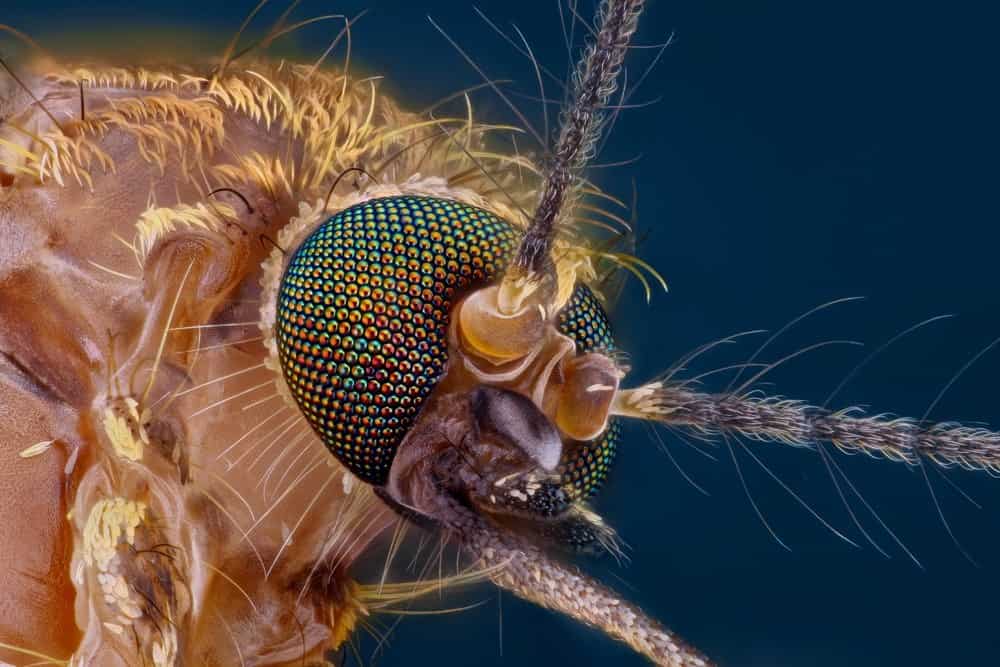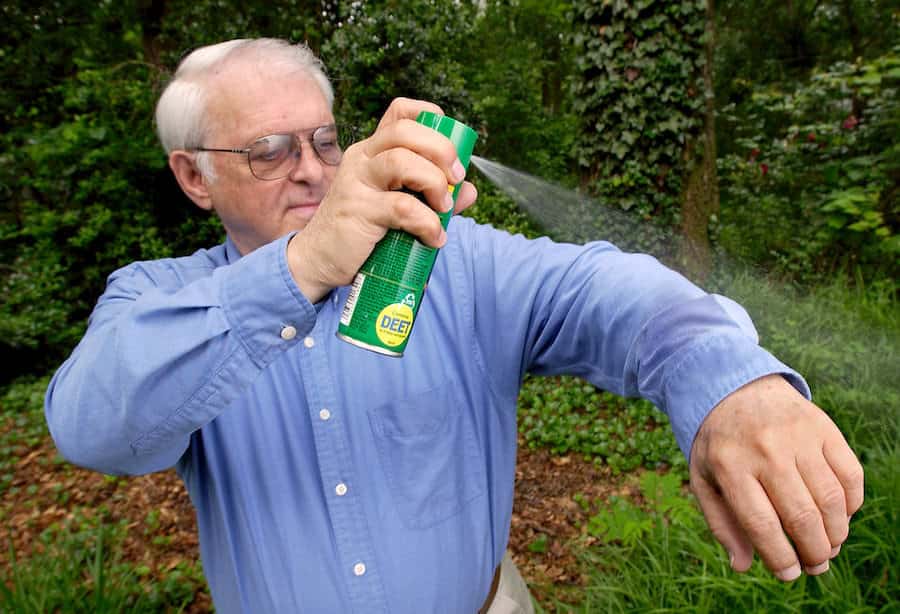Natural Mosquito Repellent for Dogs
To the majority of dog owners, their pet is considered to be a member of the family. Ensuring their dog is as safe, happy and healthy as possible is paramount to them. Many, however, haven’t thought it important to protect their pet from mosquitoes and wouldn’t consider using mosquito repellent for dogs.
When it comes to protecting your dog from mosquito bites, you must be cautious with product selection. Human repellents can be extremely toxic for animals. Everything you need to know about the best way to protect your pet is here. From symptoms, to treatments, and mosquito repellent recommendations, this article has you, and your dog, covered.
How do Mosquito Repellents Work?
Mosquito repellents contain different ingredients that work to either block a mosquito’s sense of smell or to repel the insect. These ingredients may be chemical or natural, however, both work in the same way. There are two common ingredients found in chemical mosquito repellents.
DEET
DEET, which is shorthand for the chemical N-diethyl-meta-toluamide, prevents mosquitoes from biting you; however, they may still land on you. That said, this ingredient is not safe for dogs.
Some studies have found that DEET can affect the activity of acetylcholinesterase in both mammals and insects. This is a very important enzyme found in the central nervous system. If DEET is combined with another insecticide, it is even more toxic.
With that said, it is not surprising that DEET is so effective at repelling mosquitoes. Manufactured repellents containing 10 percent DEET can keep you protected for 90 minutes. If a product contains 30 percent DEET, it can provide protection for up to six hours.
Products with high concentrations of DEET are considered dangerous for use, even on humans, because of toxicity risk. Repellents with a DEET concentration higher than 30 percent have been banned from use in Canada.
Picaridin
Another synthetic insect repellent ingredient is Picaridin. This substance is said to be less dangerous than DEET because of its lower neurotoxicity risk. Picaridin, however, has not been extensively tested.
Picaridin is found to be more effective than DEET at keeping the mosquitoes away. Unlike DEET, Picaridin will prevent mosquitoes from even landing on you, ensuring better protection from receiving a mosquito bite at all.
The US Food and Drug Administration recommends that Picaridin should not be used on children younger than the age of three. Products containing picaridin should not be used on animals.
Natural Repellent Ingredients
Common ingredients in natural insect repellents are essential oils. Lemon eucalyptus oil works very well repelling mosquitoes, due to the presence of a compound called p-menthane-3,8-diol (PMD). This can work just as effectively as DEET when it comes to deterring mosquitoes.
The clinical efficiency of PMD, to prevent malaria without any risk to human life, has been proven. Malaria is a life-threatening disease that is carried and transmitted by some mosquitoes. PMD is also the only natural repellent that is advocated by the CDC (centers for disease control).
Lemon eucalyptus oil, like many other plant oils, works similarly to synthetic repellents. Both natural and synthetic compounds act by disrupting a mosquito’s sense of smell, and the strong scent confuses them.
The effect of natural oils, such as lemon eucalyptus, can last for several hours when used as an insect repellent. Thanks to their repelling properties, a confused, nose-blind mosquito is much less likely to land on, or bite you. The EPA (environmental protection agency), however, has not registered lemon eucalyptus oil as an insect repellent.
Are Mosquitoes a Danger to Dogs?
Mosquitoes are among the most deadly creatures on Earth – if not the deadliest. They claimed over 830,000 lives in 2015. This figure is alarmingly high, compared to snakes, for example, who were responsible for 60,000 deaths in the same year.
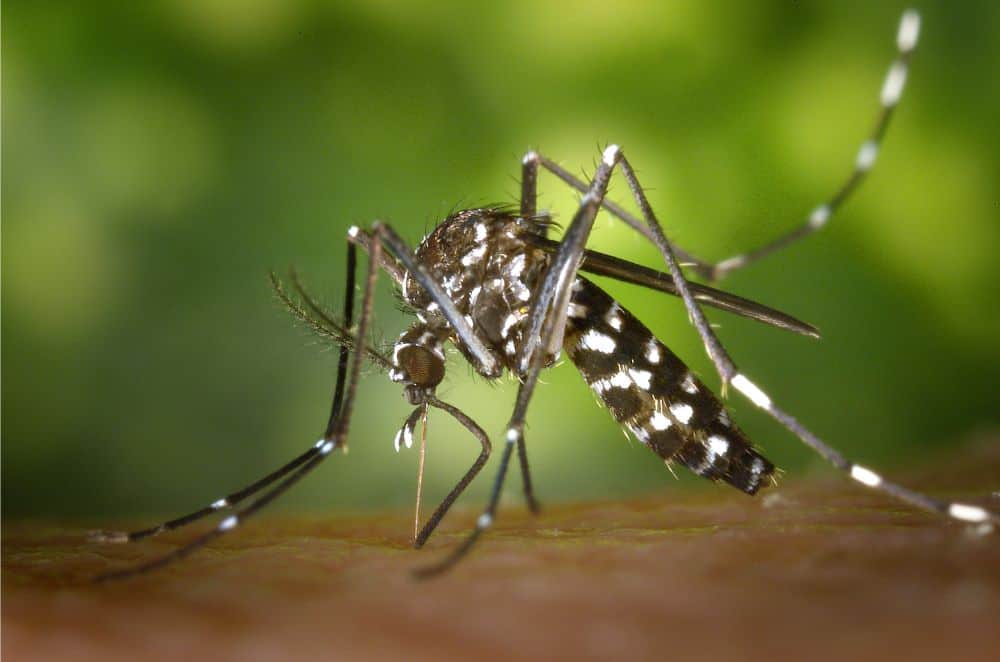
How can this tiny creature be responsible for so much damage? The answer is disease. Mosquitoes can spread Dengue fever, malaria and Zika virus, which are all potentially fatal for humans. They are able to spread equally as dangerous diseases that are critical for other creatures too, including dogs.
Why Use a Mosquito Repellent on Dogs?
The most common disease that can be spread to your precious pet, is heartworm disease, also known as Dirofilariasis. If a mosquito carrying heartworm larvae bites your dog, the larvae can easily transfer into the bloodstream.
Heartworm disease begins when the larvae reach the respiratory system and surrounding blood vessels, where they thrive. They then cause heart and respiratory failure, alongside damaging other organs in the body. It can be fatal if contracted.
It is very important to take measures to try and protect your dog from contracting heartworm. Regularly applying a pet-safe mosquito repellent to your dog should help to increase their protection.
In some areas of America, your dog may be more at risk of contracting this terrible disease. If you happen to live in an area with a higher risk, consider how to keep your pet safe.
Speak to your veterinarian about possible heartworm prevention treatment. Researching recommended mosquito repellents would be beneficial, to help prevent any bites on dogs in the first instance.
Take note, repellents can only deter mosquitoes from biting, they won’t actually kill them. If you have applied a repellent to your dog, they will still be exposed to heartworm and are not fully protected. Any repellent is only effective for a short time.
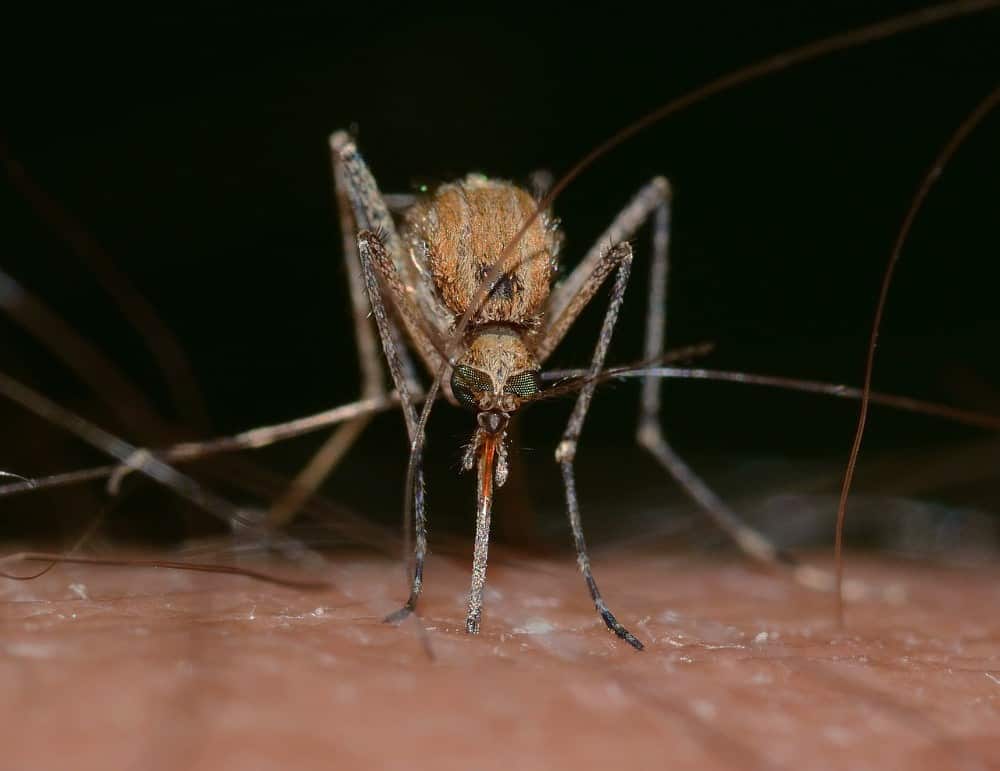
Less common diseases that may be passed on to your dog from a mosquito bite include the following. West Nile virus, systemic lupus erythematosus and Eastern equine encephalitis. However, it is highly unlikely that you will need to identify the symptoms of these diseases, as cases are very rare.
With that in mind, it is always important to take steps to keep your dog safe from mosquito bites. There is more information later in the article about the best way to use repellents, and how to keep your dog better protected from mosquitoes.
What NOT to Use as a Mosquito Repellent on Dogs
Now you understand the potential dangers of a mosquito bite for your canine companion, you’ll realize that protecting them is essential. Remember, not all repellents are safe for use on animals. You must take great care when choosing what to use as a mosquito repellent on your dog.
Chemical and synthetic repellent ingredients can have toxic effects on dogs. While repellents containing DEET and Picaridin can be safe on humans, do not use them on your dog. If a dog ingests either of these ingredients they will become very ill.
As dogs self-groom by licking themselves, there is a very high chance that they could take in these ingredients. Ingestion is also possible if you are wearing chemical repellents. Do not let your dog lick you if you have a repellent containing DEET or Picaridin on your skin.
If your dog ingests DEET, they may experience a number of negative side effects. Vomiting, diarrhea and seizures are some, but symptoms, unfortunately, are not limited to these. When DEET enters your dog’s system, it begins to attack the central nervous system, as well as the gastrointestinal tract.
If you are concerned that your dog has ingested some chemical insect repellent, consult your vet immediately. It is clear that DEET and Picaridin are to be avoided when it comes to protecting your dog from mosquitoes. However, natural, safe and effective alternatives can be used instead.

Natural Mosquito Repellents for Safe Use on Dogs
Natural mosquito repellents are much safer for use on animals, especially dogs and cats. However, that does not mean that there are no risks involved at all. Some ingredients in natural mosquito repellents can also be dangerous for your pet, so approach with caution.
The majority of natural insect repellents on the market will contain strong smelling essential oils. Did you know that a dog’s sense of smell is far more sensitive than a human’s? Remember to always dilute any oils before applying them, to avoid irritation.
In addition, essential oils are typically highly concentrated, and they can be toxic if ingested. It is best to consult your vet about which oils to use, and how best to apply them to your pet. Some oils are toxic to animals, even when diluted. Before using any natural products, check to make sure that all the ingredients are safe for your pet.
Some of the most effective natural oils for repelling mosquitoes, other than lemon eucalyptus, are:
- Thyme oil
- Geranium oil
- Fennel oil
- Citronella
- Soybean oil
- Lavender oil

It is easy to make your own natural repellent by combining a variety of these essential oils. There are many different recipes available online to help you create a natural dog-friendly repellent at home. Just be very careful about the individual concentrations and make sure the end solution is diluted well.
Making Your Own Dog-Friendly Mosquito Repellent
If you are interested in making your own repellent for your dog, here are some tips and a simple recipe for you to try. This particular recipe uses essential oils that naturally repel mosquitoes.
When buying essential oils, there are a few things to consider to ensure you are buying a good quality oil. The better the quality of the oil, the better and more effective the final product will be.
Poor quality essential oils are typically made up with less plant content and may be more diluted. So, take your time when choosing, and look for the following:
- Essential oils that are clinical-grade or therapeutic-grade
- Oils that are listed as ‘organic’ or ‘unsprayed’
- A label that includes the botanical name of the plant, this is usually a Latin name
- A label that lists the country of origin
- A distillation and/or expiry date included on the label
- Oils by a company that is a member of the NAHA (national association of holistic aromatherapy)
- Finally, consider the price. A very cheap price will most likely reflect a lower quality product
This recipe below uses a 1% dilution formula. I use six drops of essential oil to one ounce of other liquids. You will need a clean and dry spray bottle to store your repellent in.
Ingredients:
- 21 drops lemon eucalyptus essential oil
- 3 drops lavender oil
- 2 oz witch hazel
- 2 oz coconut oil or almond oil
Directions:
- Mix all ingredients well in a glass bowl
- Using a funnel to avoid spills, transfer the mix into a glass spray bottle
- Always shake well before each application, to ensure the oils are mixed well
- Spray your dog once every two days for the best coverage
Note: Do not spray onto your dog’s face or ears and avoid contact with eyes. If you want to apply some oil near or around the face, apply the spray to your hand first. Gently apply the mix from your hand around the ears, or desired area of the face.
Just because essential oils are a natural product, do not be deceived. Natural does not mean that they are automatically completely safe. It is always best to err on the side of caution when trying out and using natural remedies.
Only apply small amounts at first, and see how your dog reacts. If everything goes well, then continue to use and apply more. However, always keep your vet in the loop, for extra safety.
If you are interested in learning more about how to use essential oils safely, there is some great information here as well as a specialists blog here.
If you are not interested in, or do not have the time to make your own repellent for your dog, there are some great natural products available to buy. Veterinary physicians can recommend the best products to use which are suitable for your dog’s age, size and breed.
How to Use Repellents Effectively
The best way to use a repellent on your pet depends on the product you have chosen. If you have made your own repellent using essential oils, you will need to regularly apply small amounts.
Product application is best around your pet’s ears and underbelly, as these are areas where mosquitoes will likely bite. A dog’s nose is incredibly sensitive, so remember to avoid applying anything near there. Strong smelling oils may cause your dog significant discomfort and agitation if applied too close to the nose.
If you decide to use a commercial mosquito repellent for dogs, always follow the product instructions. Be aware that no product is the same, and some may need regular re-application, just like a natural repellent. However, other treatments may last for several weeks, like insect repelling spot treatments.
Just like keeping ourselves protected from mosquitoes, avoidance for your dog is also an effective method.
Regularly check your home for any build up of standing, still water, such as your dog’s water bowl. Mosquitoes breed and lay their eggs on standing still water, so be sure to change the water frequently.
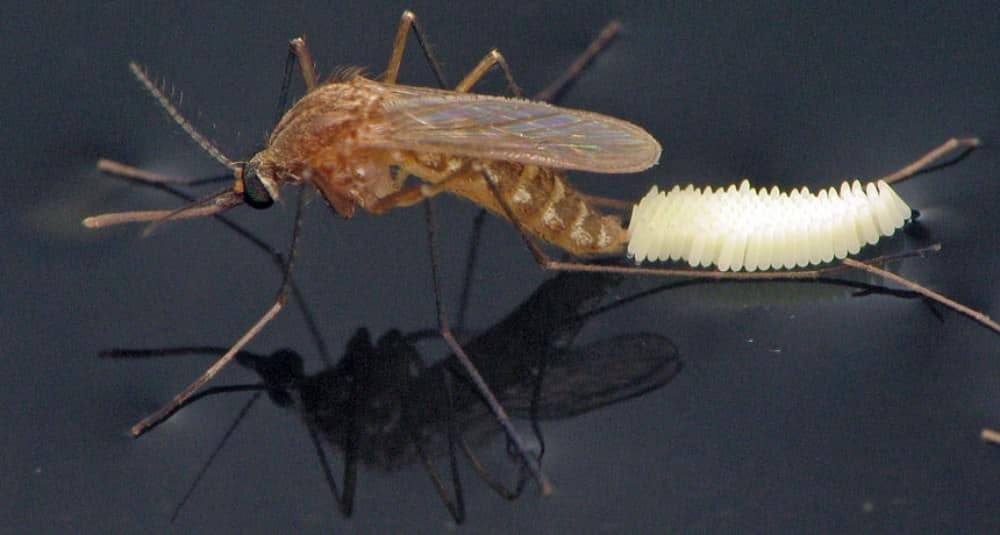
Keeping your dog indoors during dusk and dawn is one of the best avoidance methods. These are the times of day where mosquitoes are most active as they come out to feed.
Be vigilant about where you walk your dog, and also the areas your dog has access to. Considering your usual walking routes will help keep your dog away from mosquito breeding grounds. They may be scenic, but ponds and lakes, or damp, shady woodland walks, should be avoided to better protect your dog.
Risks & Precautions
There are always risks involved when it comes to applying repellent to your pooch. There is no harm in researching the product or consulting your vet. It is better to be safe than sorry.
Earlier, we discussed the high toxicity levels of chemicals, such as DEET or Picaridin, that could be fatal to dogs. Never apply them to your pet and make sure to consider this when applying these repellents to yourself. Do not let your dog lick your skin if you have applied a chemical mosquito repellent.
When it comes to natural repellents containing essential oils, a certain level of caution must also be taken. These highly concentrated oils can also be toxic if ingested by your pet. Make sure any essential oils are very diluted before using them on your pets.
If you have any concerns or queries about how to safely use a repellent, be sure to consult your vet. Veterinary physicians are able to give you advice about their usage. It is also good for your vet to be aware of what you’re applying to your dog if something does go wrong.
The best way of using repellents on your dog is to initially apply a small tester amount. If everything is ok, feel free to increase the amount. Yet, always be vigilant and keep a close eye on your dog to ensure they are happy and healthy with the repellent on.
Always follow the instructions carefully on any medication you use on your dog. If in doubt, again, speak to your veterinarian to make sure. They will be able to give you the best advice when it comes to using repellent on your dog.
Summary
There are a number of different products you can use to protect your dog from mosquito bites. However, chemical and synthetic repellents are not safe for use on your pet. Never use a product containing DEET or Picaridin on, or around your pet.
Essential oils can provide a great natural solution, that can work safely as a mosquito repellent for dogs. Remember, though, that these must also be used very carefully to keep your dog happy and healthy. As essential oils are very concentrated, they can also be toxic if not diluted correctly. One final piece of advice is: the best cure is prevention.




